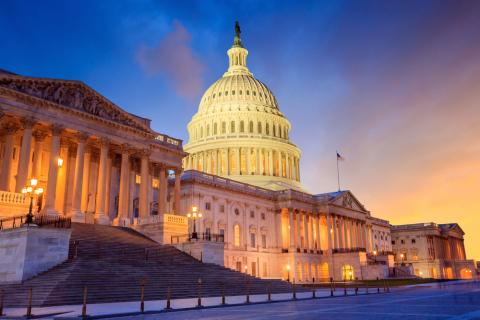Congress Halts Potential Rail Strike in Its Tracks

CPGs, distributors, retailers and consumers can breathe a little easier now that a potentially costly and disruptive rail strike at one of the worst possible times has been averted. Following an up vote in the U.S. House of Representatives, the U.S. Senate voted by an 80-15 margin on Dec. 1 to compel railroad companies and workers to agree to the government-brokered settlement proposed in September. The legislation now goes to President Biden’s desk for signature.
The intervention of the legislative branch of the federal government – following urgings by Biden – reflected the high stakes of the strike during the peak holiday season. "Working together, we have spared this country a Christmas catastrophe in our grocery stores, in our workplaces, and in our communities,” said Biden at the White House, acknowledging that is difficult to override traditional union ratification processes. “But in this case, the consequences of a shutdown were just too great for working families all across the country. And, the agreement will raise workers’ wages by 24%, increase health care benefits, and preserve two person crews.”
Retail and CPG industry leaders expressed their gratitude for the solution. “FMI commends Congress for swift bipartisan passage of legislation to avert a rail shutdown and keep the nation’s freight rail networks operational. A rail shutdown would have been devastating for the food industry and consumers alike, particularly over the busiest shopping season of the year, as a rail closure would have cost the U.S. economy $2 billion per day," said Jennifer Hatcher, chief public policy officer at FMI – The Food Industry Association. “We are pleased that lawmakers on both sides of the aisle in the Senate and House recognized the importance of keeping goods flowing and prioritized passage of this vital legislation ahead of the weekend. We look forward to President Biden signing this legislation into law so that essential industries like food retailers and manufacturers can continue doing what they do best – serving their customers with safe, nutritious foods.”
Tom Madrecki, VP of supply chain and logistics for the Consumer Brands Association, also lauded the effort to avoid a possibly catastrophic supply chain problem. “We’re glad Congress met our call to step in and put the rail strike to rest before it impeded consumer access to the essential products they rely on. While a full-blown crisis was narrowly avoided, the severity of its potential impact demonstrates why Consumer Brands supports longer-term legislative solutions to bolster our supply chain,” said Madrecki.
Meanwhile, in a development with potential implications for other industries with unions, the sticking point of this negotiation was paid sick leave for workers. Biden said that he wants widescale paid leave for “everybody” instead of having it be a part of benefits programs and employee contacts, something that organizations and other political figures oppose.







